Let's Make a Trade
Pop quiz! It's your turn three. You're Gaston—do you attack here?
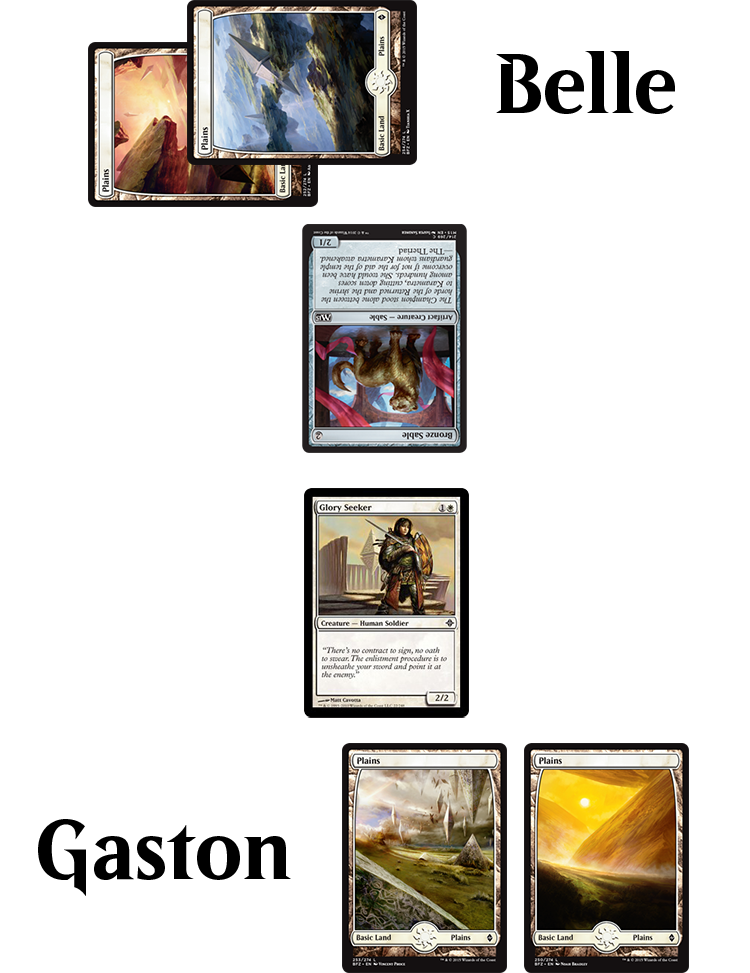
Like most questions in Magic, your first instinct is probably to answer the above situation with "It depends." But as a default state, what would you do?
Think on it.
In the meantime, let me kick things off. Today we're covering trading! And no, not if you should trade your premium foil Archangel Avacyn for their Misty Rainforest—we're talking about the art of trading your creatures in combat.
Trading your creature in combat is when, through attacking and blocking, one creature dies and causes another creature to die. For example, if I attack with a 2/2 and you block with your 2/1, that's a trade.
There's a lot about combat I want to write about, and so we're going to kick it off this week by honing in and looking at combat situations involving a trade on either side.
When is it right to trade? When is it right to offer a trade? And when is it right to hold back? There are a number of things that should inform this decision.
Keep your answer to the above situation in your head for now (and remember that Gaston starts with a G, like Glory Seeker, and Belle starts with a B, like Bronze Sable) and let's keep moving on.
Informed by Your Hand
The most apparent and obvious information you have is what's right in front of you: what's in your hand!
This is the information you know is definitely going to be relevant this game, and should inform a lot about if you want to make a trade or not.
One way this commonly plays out is with creatures.
Let's say you're Gaston and you have a Knight of the Pilgrim's Road in your hand.
You really want this Knight to get through. As a result, you would love for your opponent to trade here—that means you can play the Knight, and if you're unimpeded, it will be able to become renowned next turn.
I would definitely attack here.
Now let's flip the script a little bit.
Let's say you're Belle in the above situation. Gaston attacks with his Glory Seeker. You have a Plains and Militant Inquisitor in your hand. What do you do?
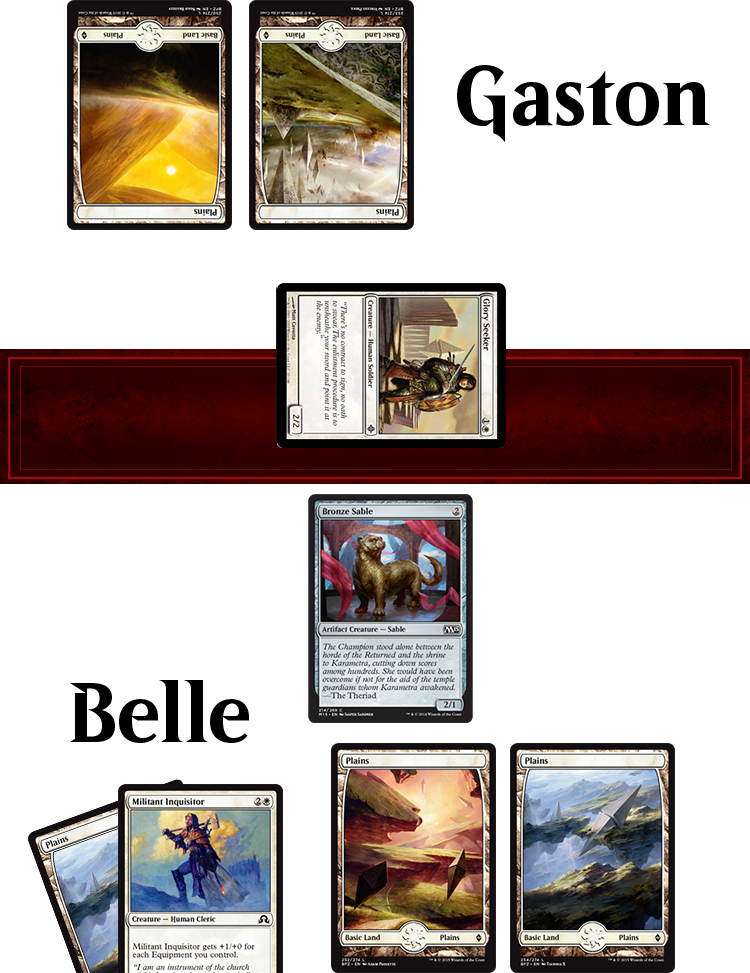
You could trade off your creatures—but, if you just wait one turn, the Inquisitor virtually negates the 2/2 on Gaston's side of the board from attacking you. By keeping the Sable, you enable yourself to potentially attack back—or combine with the Inquisitor to take out something more threatening in the future. I would not block in this situation.
Another place this commonly comes up is with mana flood or screw.
Let's say that you have no more lands in your hand, and your next play is a four-mana card. In this situation, you absolutely want to trade off since you need to buy time to draw some lands.
If this is your position and you're Gaston, you should not attack and try to trade. If this is your position and you're Belle you should absolutely trade if Gaston attacks. You aren't going to win a damage race, and if you don't trade now, you're likely going to face the same decision next turn.
In addition to creature size and lands in hand, any number of other cards in Magic can factor into this decision as well. If you have a Whipflare in your hand, for example, then you should definitely try and trade off your Glory Seeker if possible. (And, conversely, if you're the one with the Bronze Sable, you should not trade.)
You should always think about what's in your hand and how the game is going to play out when considering a potential trade.
Informed by Your Strategy
The cards in your hand are only one aspect of what you know about the game. A huge additional part is knowing what your strategy is.
Let's say you're in Gaston's shoes. It turns out his deck is a fairly controlling white-blue deck. The plan is to go long and win with card advantage and expensive-to-cast cards. You end up in the exact situation above: your Glory Seeker staring down their Bronze Sable.
What do you do?
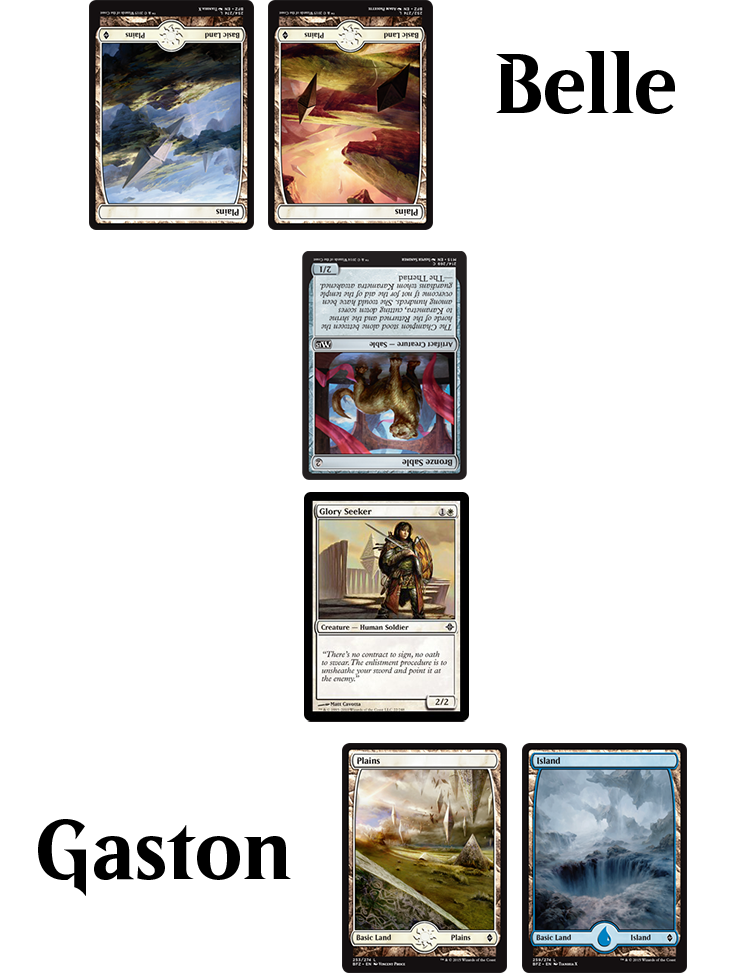
In this case, generally I would not attack.
This deck is going to win the long game. If you make the game go as long as possible, you are going to be advantaged. As a result, you don't want to trade 2 damage for 2 damage. You want to trade off early game resources and protect your life total, because you're going to have the long game advantage.
Knowing your deck is extremely important for knowing whether you want to make trades or not.
There are also some specific cards that often factor into this. For example, let's say your deck has Overrun in it.
If you have Overrun in your deck, you generally want to avoid making trades where you can. Every extra creature you have becomes a big deal when you cast Overrun. Now that doesn't mean never trade—but in close, early calls like this, you can usually err on the side of not trading.
Now, let's say that you are playing a quick, aggressive deck. If you're Gaston, you should likely attack here. If you're Belle in this situation and you are attacked, you shouldn't block.
Why? Well, if you're Aggressive-Deck Gaston and you attack and they don't block, it's just 2 free points of damage for you. If you attack and they do block, you're just making a trade that's probably going to happen anyway and involves a relatively weak creature—which also clears the way for your stronger future creatures.
With that said, Gaston should also take his deck knowledge into account. If his deck is full of cheap removal, then the chance to try and get in damage after you've cleared that Sable off means it's probably right to hold back, whereas if his deck is full of 3/2s then you'd want to lean toward trading off.
If you're Aggressive-Deck Belle and they attack, your plan is to deal as much damage as possible as quickly as possible—so you'd prefer to try and get in 2 points of damage with your creature on your turn instead of trading off by blocking. Saving 2 points of your life total is probably less relevant than taking 2 points from theirs.
Knowing your deck is very important to knowing when to trade or not.
Informed by Your Opponent's Strategy
Just as you know your own strategy, knowing your opponent's strategy is crucial. As Chinese philosopher and strategist Sun Tzu once said, "If you know the enemy and know yourself, you need not fear the result of a hundred battles." And while he might have been exaggerating a little bit in terms of Magic battles, the Chinese master isn't that far off.
You're not always going to know what your opponent is up to—but when you do, you can use it to your advantage.
Let's say you're Gaston, and while your deck is a fairly typical midrange Limited deck with an average curve, you know that Belle's deck is extremely aggressive, full of two- and three-drops. In that case, you wouldn't want to attack. It's the classic question of who's the beatdown: your opponent is the beatdown here, and so you want to trade off to run them out of resources and survive until the late game. Even though your deck isn't built to normally be a control deck like the previous example, in this situation you become the control deck.
Similarly, if you're Belle here and you know Gaston's deck is the super aggressive deck, you absolutely want to block if he attacks. Similar to the above situation, you generally want to become the control deck and attempt to preserve your life total and win with larger creatures.
Trading Up and Trading Down
Okay, so these have been a lot of examples involving two very similar creatures. And while this can be expanded out to cover a wide variety of interactions between similarly sized creatures, those aren't the only kinds of trades that happen. Sometimes, there are creatures of varying sizes around. And what do you do about that?
An extremely simplified rule of thumb you can follow is this: you generally want to trade up and avoid trading down.
Let's say that in this situation Gaston has a Glass Golem, and Belle still has a Bronze Sable.
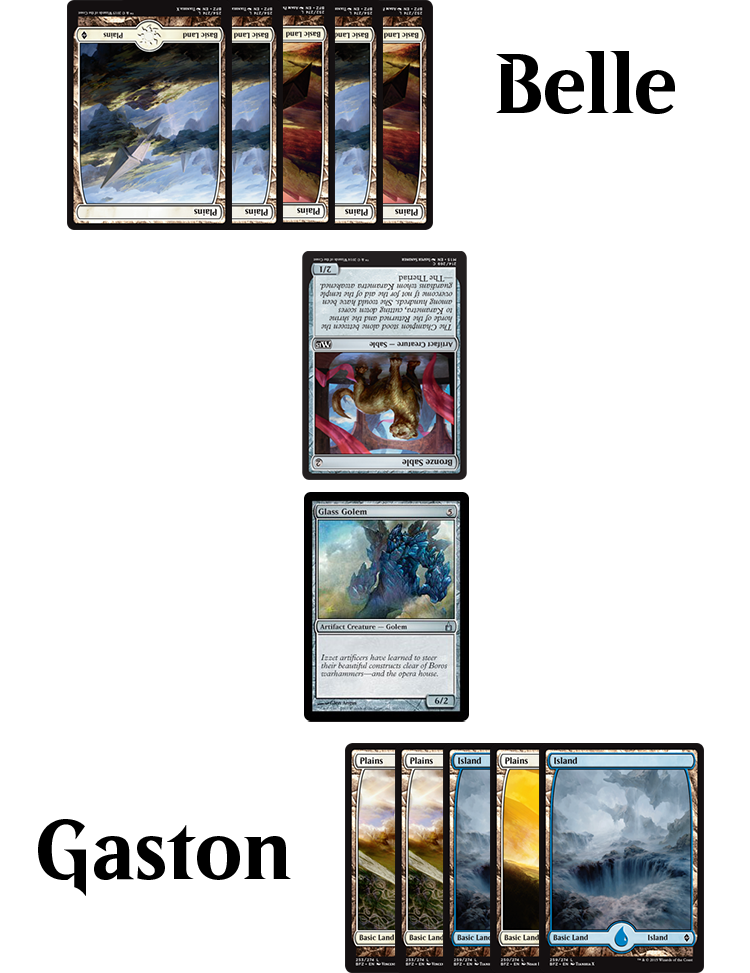
In this situation, if you're Gaston you should absolutely avoid trading that Glass Golem for that Bronze Sable—and if Belle has the opportunity to make that trade, she definitely should.
A 6/2 is much, much larger than a Bronze Sable. Even though it can't get through now, if at some point the coast is clear—say Bronze Sable is forced to block somewhere, or gets shocked—the coast is clear and Glass Golem can truck on through. Even if they just stay on defense forever, Glass Golem is much more effective: it can trade with most large creatures.
There are exceptions, of course—but in general, this is a bad trade for Gaston to make.
Weighing Abilities
Up until this point, we've mostly talked about vanilla creatures—creatures with no other abilities besides being creatures. But the vast majority of Magic cards, of course, have abilities! And how do you weigh trading with them or not?
Let's take this scenario, for instance. (Assume there are currently no cards in graveyards.)
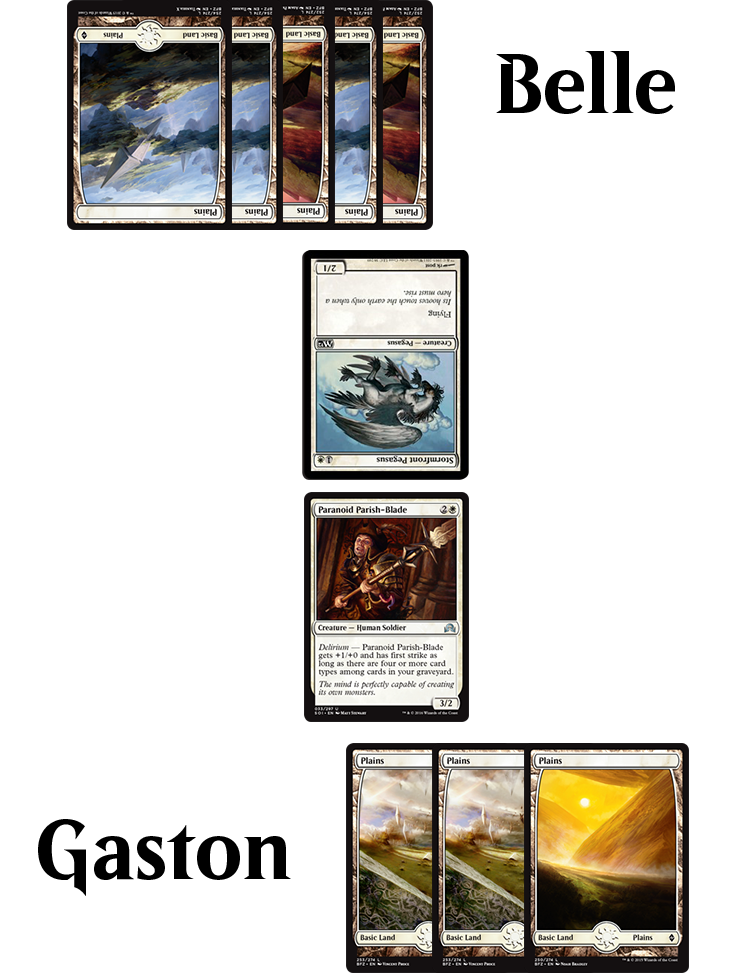
These creatures could trade with each other if they tangle—but is it worth it? Will it even happen? Let's break it down.
Gaston's creature is larger—but flying is an extremely valuable ability. Whereas a 3/2 might get outclassed by any number of other ground creatures, a 2/1 flier will remain relevant until your opponent plays a 3-toughness flier or reach creature.
Of course, Gaston's creature also has a relevant ability here: it becomes quite strong when delirium turns on.
How do you weigh these disparate things?
Well, this process involves a couple steps. The first is taking everything we've already talked about—knowledge about your hand and each of the decks—into account. Then, you need to take that knowledge and use it to peer into the future as much as you can.
Peer into the future? Yes!
What I mean is using all of that information to think about how this game is going to play out. For example, if Gaston's hand is full of four different card types that are going to head into his graveyard shortly, then he wouldn't want that trade to happen.
On the flip side, if Gaston knows that his deck is light on fliers (and perhaps last game lost to Belle's onslaught of flying creatures), then he would love for this trade to occur. In general, if I were Gaston, I would attack here.
If Gaston attacks, Belle will take similar knowledge into account. If she indeed won the last game with flying creatures and knows Gaston is light on fliers, then perhaps she wants to take the damage. However, if she's light on lands and needs time to stabilize or risk losing a race to the Parish-Blade, she may want to trade off here.
However, if Gaston attacks, then Belle knows something: Gaston is okay with that trade happening. And that's information on its own. Which brings us to...
Think Like Your Opponent
In combat, the defender always has more information than the attacker. Why? Because they have to make their choices second!
This means that if you're Belle here, you get to ask yourself one of the most important questions in Magic: "Why did my opponent do that?"
Consider this situation:
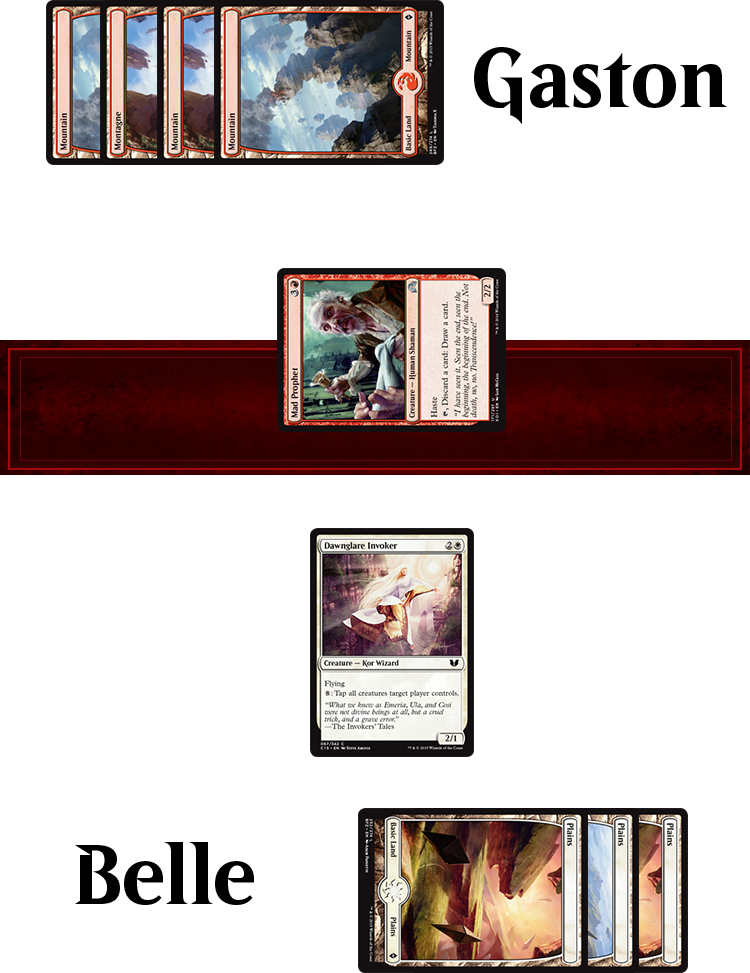
Gaston slams Mad Prophet and attacks with it. If you're Belle, that tells you something: Gaston is okay trading his Mad Prophet for your Dawnglare Invoker. It's unlikely he would be attacking if that was a trade he didn't want to make. (It also probably tells you his hand is pretty good or he has very few ways to deal with that Invoker, since he's attacking rather than rummaging.)
Then, if you're Belle, you can use this information accordingly to figure out if you want to trade or not. Generally, if your opponent wants you to do something, that's a good sign that either you shouldn't do it or you know something your opponent doesn't.
Tricks of the Trade
Something to always weigh in these equations is a Magic gameplay staple: the combat trick!
Cards like Giant Growth seek to turn trades between creatures into trades for the spells. You can always use these effectively to attack without fear—but it's important to make sure you actually want to use the trick in the first place!
Take this board state.
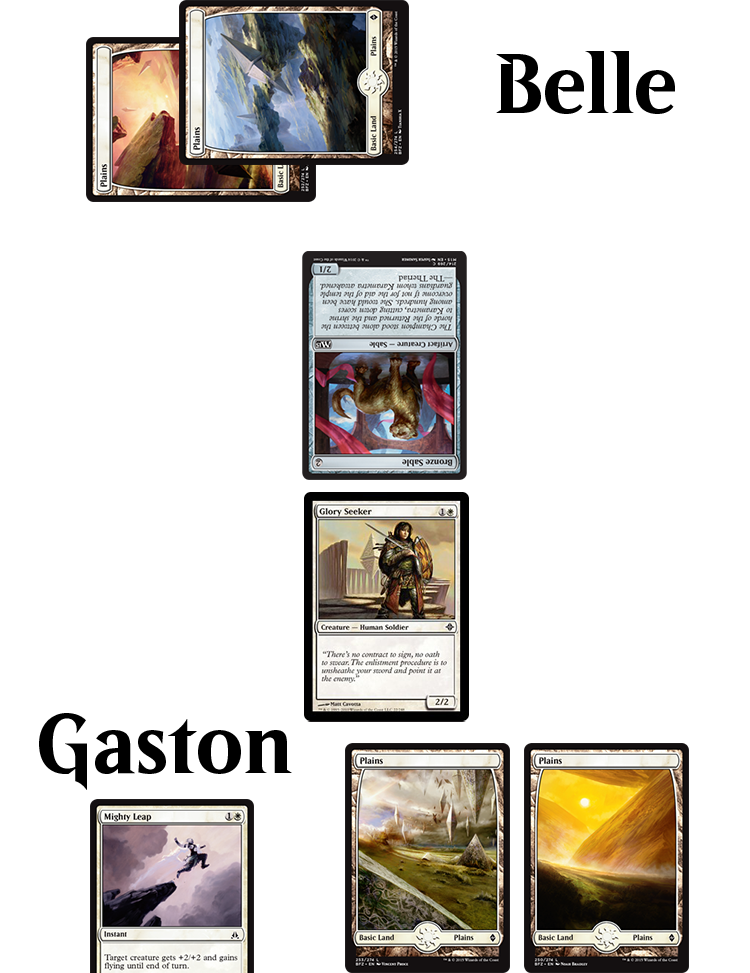
Here, Gaston has a Mighty Leap, and if Belle blocks he can use it to take down her creature. Bam! That all sounds awesome, right?
...Well, not really. Gaston is spending his second two to use Mighty Leap as a removal spell—essentially a Doom Blade that also prevents your creature from dealing damage—to kill off that Sable and keep his Glory Seeker. If I was Belle and Gaston made that play, I would internally be fist pumping.
It's still a fine attack to make—but I wouldn't use the trick here if Belle blocks. That Mighty Leap is very likely going to be useful further down the road. If it was, say a Bandage, that didn't cost me a card to cast and was only one mana (so I could maybe play another two-drop), then I'd be a lot more interested in it.
The moral of the story is, when factoring in tricks, make sure you'd actually want to use the trick in this situation!
Creatures Are What They Are
One thing I want to briefly touch on is perception of "strong" creatures versus "weak" creatures. Once a creature is on the table, it's there doing its thing—regardless of how highly or lowly you might regard it.
Consider this situation:
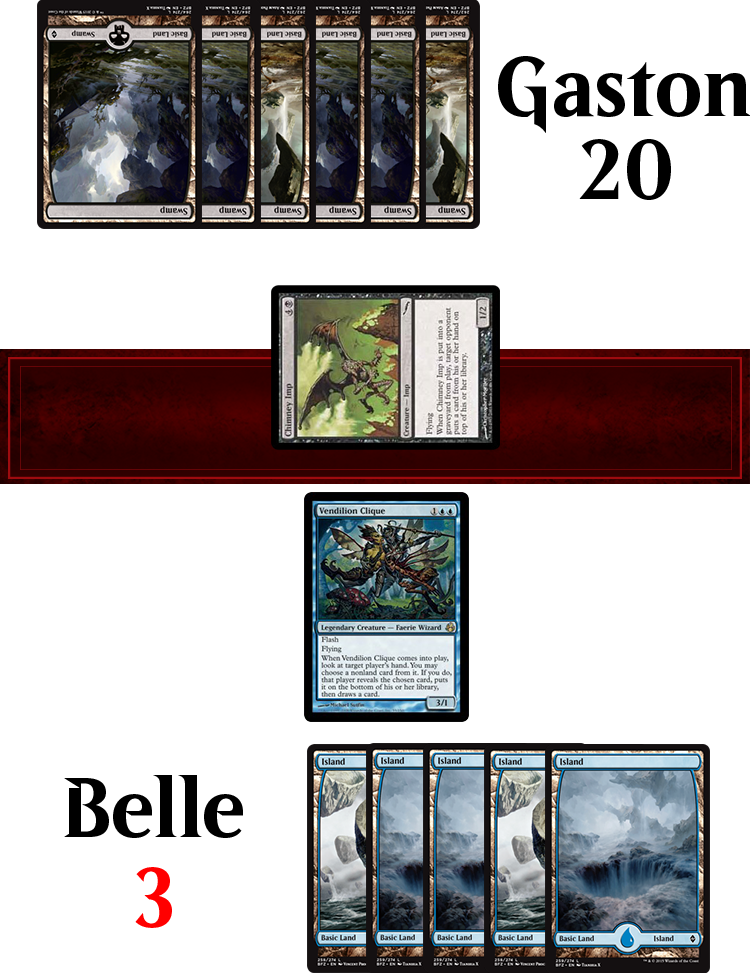
Chimney Imp is a bottom-of-the-barrel card, as a five-mana 1/2 flier with a relatively weak ability. Vendilion Clique is an extremely strong card that has seen play at all levels of the game.
If you use their relative strength to compare whether you should trade, then the trade looks abysmal for Belle! Vendilion Clique is much more worth having.
However, that doesn't matter here: Belle has to realize she is not going to win this race! Her opponent is at 20, and she's at 3. If she takes this hit and attacks back with the Clique, she's still going to die to the Imp in two more turns.
Glory Seeker versus Bronze Sable is a much, much less pronounced version of this effect: the Seeker is better than the Sable as a two-mana 2/2 versus a two-mana 2/1. However, unless your deck is full of 1-power creatures or you anticipate a lot of double blocking happening, they are close enough that I would consider them about equal for purposes of the trade.
Adrian Sullivan once called this the secret "crappy" mechanic, where your opponent would play poorly around weak cards. And while I certainly wouldn't go to lengths of employing cards of Chimney Imp's caliber in your deck, keep in mind that once a creature is on the table its cost has been paid and now you should evaluate it for what it is. Much like Ke$ha proclaims, creatures "R Who They R." It doesn't matter if that 3/3 flier cost your opponent one mana or seven mana; it's still a 3/3 flier.
"Blocks?"
And finally, the last note, and a very important one: sometimes your opponent just won't block!
While it is always the defender who gets to make the decision, they don't have all the information you do—and many times they will just view it as kind of a coin toss as to if they should trade or not on an even board. (Though now that you've read through this article, hopefully we all realize it's a lot more than that.)
It's important to take everything into account and run all the variables we've discussed. But if your deck wants to deals damage and the decision comes up close in your mind, usually I favor attacking.
So let's go back the original situation, from the beginning of the article. Back to just Glory Seeker versus Bronze Sable. What do you do?

Do you have your answer?
Me personally? If I'm Gaston, I would definitely attack, and if I'm Belle, I would definitely block. An unusual scenario, given that usually if both players are okay with an outcome somebody is wrong. But here, you just don't have enough information. (You could argue that if you believe you are the stronger player, you don't want to trade because complicated boards favor the better player—but that's a whole other article!)
Of course, this all gets modified by the many, many factors we've already discussed—no decision in Magic is really made in a vacuum like this.
And of course, there's actually some debate here; different people play combat situations differently. While writing this article, I asked on Twitter and received a wide variety of responses.
In the general poll, people indicated they were much more likely to attack, with only about one in every five people holding back.
Turn two, you play a 2/2 Glory Seeker. They play a 2/1 Bronze Sable. Turn 3, everything being equal, do you attack?
— Gavin Verhey (@GavinVerhey) June 15, 2016
A few pros weighed in. Some agreed. Former Level One columnist Reid Duke holds the same view.
@Gildoreth @GavinVerhey Yes, I think this situation should almost always play out as, "Glory Seeker attacks, Bronze Sable blocks."
— Reid Duke (@ReidDuke) June 16, 2016
Limited pundit Ryan Spain brought up a good point: the player with untapped mana is always advantaged (though unless there's actually a trick worth spending mana on, as noted earlier, it doesn't always translate into having an advantage).
@GavinVerhey It's a pretty meaningless question since MTG is all about context, but attack b/c the player w/untapped mana is advantaged.
— Ryan Spain (@RyanSpain) June 15, 2016
On the other hand, Hall of Famer Paulo Vitor Damo da Rosa takes the other position. Instead of putting power in his opponent's hands, he would rather pass and gather information about what his opponent wants to do—cluing him in to their potential strategy.
@GavinVerhey however, if forced to answer without context, my answer is "no" because attacking lets the opponent make the decision.
— Paulo Vitor (@PVDDR) June 16, 2016
Paulo and I actually talked some after the tweet over private message afterward, as we both found it an interesting topic. We agree in some places, and disagree in others. He mentioned he may write about it as well—so stay tuned for something similar from him around the time of this article.
But, most important of all, I think Brian Braun-Duin has the right idea.
@GavinVerhey There's plenty of context here to answer this question. You don't call a card "Glory Seeker" if it's going to sit back at home.
— Brian Braun-Duin (@BraunDuinIt) June 16, 2016
Fair enough, Brian. Fair enough.
Now I have written more words about Glory Seeker and Bronze Sable than you may have thought possible. Hopefully you enjoyed following along!
While I mostly focused on more illustrative or Limited gameplay examples here, know that these same skills translate directly into Constructed. One interesting note there is that often you have a much better idea of the shape of your opponent's entire deck within the first couple turns, so you can really take advantage of that! Use that information wisely.
That about does it for me this week! I'll be back next week. If you have any thoughts or feedback, please send me a tweet or ask me a question on my Tumblr, or if you're more of the emailing type, you can reach me at BeyondBasicsMagic@Gmail.com.
May your Glory Seekers always find glory,

